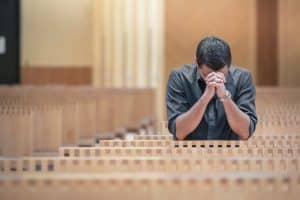
Partakers In The Divine
Podcast: Play in new window | Download
Subscribe: Apple Podcasts | RSS
Jesus gave His followers tall marching orders when He said “love your enemies and pray for those who persecute you.” He followed that up with, “be perfect, just as your heavenly Father is perfect.” Is Jesus challenging us to be god-like? In fact, He is! Find out what this means in your life. Please read more.
 Lent gives us an ideal time to ponder the big questions of life. Who am I? Why am I here? Where am I going? Today I want to explore the third question: where am I going? Said differently, what is my destiny?
Lent gives us an ideal time to ponder the big questions of life. Who am I? Why am I here? Where am I going? Today I want to explore the third question: where am I going? Said differently, what is my destiny?
I hope you will find this message theologically thought provoking and challenging. This topic is essential to our destiny as Christians and yet it is rarely discussed.
Any time Jesus says, “You have heard that it was said,” He is about to shake things up. He is about to up the ante and raise the bar. Many religions teach that people should love “their neighbor”. Clearly that is a good premise to live by. After all, how hard is it to love those who love you? Jesus’ teachings take us to a new, never seen before level, and He demonstrated His teachings through His cross-centered life. Here are some of those teachings:
- Offer no resistance to one who is evil.
- Turn the other cheek to one who strikes you.
- Give your cloak to the one who asks for your tunic.
- Walk two miles when only asked to walk one.
- Love your enemies.
- Pray for those who persecute you.
- Be perfect as God is perfect.
 Oh my, this is radical stuff! I can’t speak for you, but these teachings seem impossible to achieve. They seem super-human. These teachings indicate that the goal of a Christian is to become god-like. Is that even possible? Is this call to become god-like scripturally sound? Or is this some form of new-age thinking? Let’s find out.
Oh my, this is radical stuff! I can’t speak for you, but these teachings seem impossible to achieve. They seem super-human. These teachings indicate that the goal of a Christian is to become god-like. Is that even possible? Is this call to become god-like scripturally sound? Or is this some form of new-age thinking? Let’s find out.
The teaching of becoming god-like is biblically sound. This is nothing new. In 2 Peter 1:3-4 we are taught that through knowledge of Jesus Christ, and through His glory and power we may “come to share in the divine nature.” This was also taught in the earliest days of the Church by St. Irenaeus, and confirmed in teachings of Sts. Augustine and Thomas Aquinas. In fact, every Sunday, Catholic priests say this prayer. “By the mystery of this water and wine may we come to share in the divinity of Christ who humbled himself to share in our humanity.” As Christians, we are all called into the divinization process.
 Jesus’ teachings are unlike any other moral philosopher. Nearly all religions call their followers to live upright, moral lives. Jesus gives His followers a higher calling! He calls us to nothing less than to be “divinized”. We are called to share in the life of God. Certainly, God wants to save us from our sinfulness, that is why He sent His only begotten Son. He also wants to transform us though grace so to be partakers in the divine.
Jesus’ teachings are unlike any other moral philosopher. Nearly all religions call their followers to live upright, moral lives. Jesus gives His followers a higher calling! He calls us to nothing less than to be “divinized”. We are called to share in the life of God. Certainly, God wants to save us from our sinfulness, that is why He sent His only begotten Son. He also wants to transform us though grace so to be partakers in the divine.
Let me state this as clearly and concisely as possible. We are not God, and we never will be. We will not one day become a god as some religions teach. Divinization is also not some type of restoration back to a lost godliness as some faiths believe. Divinization is a type of spiritual metamorphosis, a conversion though grace, that prepares us to one day partake in God’s divine life.
Okay, enough of the theological heavy stuff. What does this mean for you and me today? How can we, while on this side of death, participate in the life of God? We are called to grow our faith through virtue, knowledge, self-control, endurance, devotion, mutual affection, and love.
 Divinization takes place in stages. We must go through a purgative process. By the power of the Holy Spirit, we must be purged of our passions and sinful ways. We must grow in our knowledge and understanding of God. The divinization process also takes takes place within the Church. We are transformed and divinized through active participation in the Body of Christ.
Divinization takes place in stages. We must go through a purgative process. By the power of the Holy Spirit, we must be purged of our passions and sinful ways. We must grow in our knowledge and understanding of God. The divinization process also takes takes place within the Church. We are transformed and divinized through active participation in the Body of Christ.
When we love others as ourselves, when we are forgiving, when we care for the poor, needy, hungry, homeless, sick, or imprisoned, when we show compassion, and in general, when we act in a Christ-like manner, we are, in our human way, participating in the divine life.
It might surprise you to find out that one of the primary paths to divinization is found in our spiritual struggles. Most often, it is the broken areas of our life that force us to our knees and cause us to repent and acknowledge our utter dependence on Jesus to save us from the power of sin. At times like these we place our faith and trust in Jesus and strive to live more like Him.
 In conclusion, we cannot achieve a state of full holiness and perfection during our earthly life. We can, however, hold onto the understanding that the divinization process, which began at Baptism, leads us towards a time when we will, after our death, come to share more fully in God’s divinity and that indeed will be a glorious day!
In conclusion, we cannot achieve a state of full holiness and perfection during our earthly life. We can, however, hold onto the understanding that the divinization process, which began at Baptism, leads us towards a time when we will, after our death, come to share more fully in God’s divinity and that indeed will be a glorious day!
Heavenly Father, shape me, mold me and transform me in this life, so that one day I may more fully share in your divinity. In Jesus’ name I pray. Amen.
AMDG
As always, I love to read your comments below as well as hear from you personally you can reach me by clicking here.
________________________________________________________________________________________________________________________________________________________
UPCOMING RETREAT
Saturday March 11, 2023
Immaculate Conception Parish Ithaca, NY
For more details click here.
Please take a couple minutes to watch the video about my new book. The book is available on this website and on Amazon.com. It is also NOW AVAILABLE IN SPANISH. Please be sure to like the video and to leave a review of the book on Amazon after you have read it. Thank you!
- What Is The Church’s Role In Society? - July 21, 2024
- The Thorn Remained - July 14, 2024
- The Confounding Nature Of Freedom - July 7, 2024

HI Brian, Got a question for you. Does love your neighbor / your enemy extend to the likes of a hitler? Will it include the anti-Christ some day? Your thoughts please.